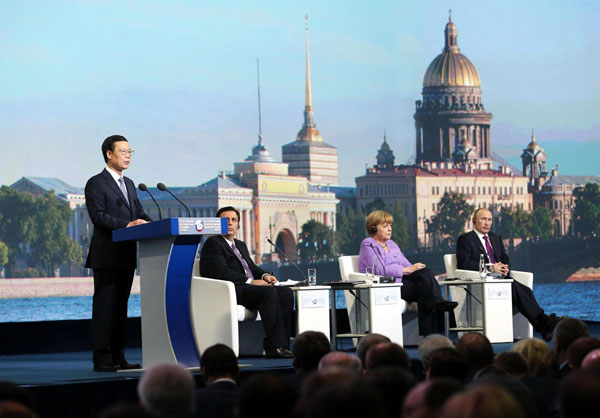
 |
|
Chinese Vice-Premier Zhang Gaoli (L) delivers a speech at the 17th St. Petersburg International Economic Forum in St. Petersburg, Russia, June 21, 2013. [Photo/Xinhua] |
SAINT PETERSBURG - China and Russia are putting their words into action as leaders of the two countries have pledged to expand cooperation in a pragmatic manner.
As Chinese Vice-Premier Zhang Gaoli is visiting Saint Petersburg, Russia, for an international economic forum, ?China National Petroleum Corporation (CNPC) and the Russian oil giant Rosneft on Friday signed a long-term agreement for oil deliveries with an estimated value of $270 billion, a good progress made in energy cooperation between the two neighboring countries.
Energy cooperation between China and Russia holds great potential and has gained steam in recent years as the overall ties between the two nations are in their best status than ever.
"Russia and China are strategic partners, and the cooperation in energy has been positive," Rosneft CEO Igor Sechin told Xinhua on the sidelines of the Saint Petersburg International Economic Forum, saying his company would cooperate further with Chinese partners.
It is believed that the CNPC-Rosneft deal would reshape the geographic feature of Russia's oil exports, which currently are mostly Europe-oriented.
For China, the world's second largest economy and a major energy consumer, Russia could offer it with oil and gas to power growth, while for Russia, China would become an ideal export destination for its energy as demand in its main market - Europe - wobbles amid economic woes.
Also on Friday, Russian President Vladimir Putin said at a plenary session of the forum that Russian energy company Gazprom is readying contracts for the gas deliveries to Japan and China.
The Chinese vice-premier, who began his visit in Saint Petersburg Wednesday, is due to leave Russia Saturday. ?His visit came in the wake of the successful summit held in Moscow between Chinese President Xi Jinping and his Russian counterpart Putin in March, which is intended to translate the latest highest-level consensus into concrete results, with energy cooperation coming high up on the agenda.
The Chinese vice premier's schedule was packed with bilateral meetings with Russian political leaders, including Russian President Putin, as well as business leaders in the country's energy sector.
"China would like to work together with Russia to maximize the potential for bilateral economic cooperation and translate the best ever political relationship into results of practical cooperation," Zhang said at a meeting with Putin Thursday.
Analysts said the frequent high-level contacts between China and Russia play an important role in boosting bilateral cooperation.
"Frequent contact between the two countries' leaders has created a political foundation for further economic cooperation," noted Wu Hongwei, a researcher with the Institute of Russian, Eastern European and Central Asian Studies under the Chinese Academy of Social Sciences (CASS).
The two countries are also exploring new areas to deepen relations.
When meeting with Putin, Zhang proposed that the two countries should carry out the projects already agreed upon in such areas as energy, infrastructure and investment, while expanding two-way cooperation in high-tech industry, launching new forms of cooperation such as joint research and production, and introducing new projects in new energy, environmental protection and manufacturing.
Putin said the two countries have designated energy and high- tech technology as the two areas of priority for further development, and cooperation in the long-term, large projects are showing strong momentum.
"Both governments have strong will to strengthen cooperation, and I believe the practical cooperation between Russia and China has a bright future," he added.